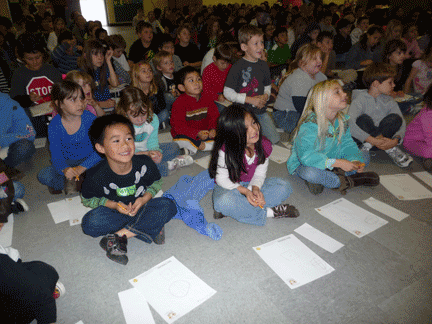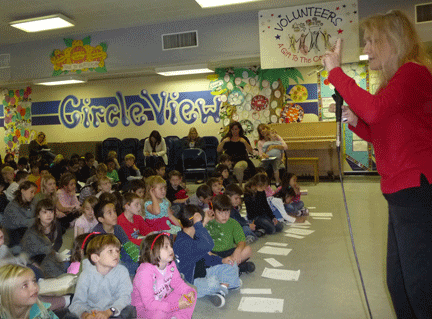

Kids NEED Art! When it’s added to their Educational ‘Diet’, EVERYONE WINS!
In the report of the National Council on the Arts 3/30/2012, Dr. James Catterall presented conclusive evidence that “High arts kids considerably outperform Low arts kids” in every area.” His work revealed why students engaged in the arts do better academically, linking art and cognitive development and leading to pro-social behavior later on in life. “Why?” to paraphrase Dr. Catterall,
“Doing art is solving problems, is stimulating, and helps brain function in a variety of ways… It helps spatial reasoning, cognitive development, engagement and motivation…which also adds to social and cultural engagement in school.”
(More info at Dr. Catteral’s Centers for Research on Creativity)
Since the removal of the Arts from low income schools, children in the U.S. have fallen behind in math and critical thinking skills. People say that “children are our future” – yet few know what to do. That’s why EDU DESIGNS is determined to lend a hand in a practical way. Donating EDU DESIGNS Art presentations to schools, plus our character building books, (including SEE WHAT YOU’RE LOOKING AT, the first Art Textbook to reference the Core Standards) allows Art to once again be back in the classroom where it belongs, inspiring kids to learn and increasing their creativity.
 (Note: Find out more about the book, HERE.)
(Note: Find out more about the book, HERE.)
His report clearly confirms earlier findings which reveal:
“More and more emphasis has been placed upon performance in the standards testing process today. Unfortunately this has created an atmosphere of greater stress – on the student as well as the teacher. Ironically, it is a well-known fact that Stress inhibits learning [1]. Fortunately, Art is a stress reliever [2], utilizing the parts of the brain that increase memory and higher thought. [3] With this in mind, ART employs a hands-on approach to logical reasoning, using relevant objects in our environment to connect us to the need for mathematical and spatial understanding. This book is unique in correlating concepts of ART and MATH. By developing creative and critical thinking skills, children gain confidence in their problem-solving skills. [4]“ Students with high levels of arts participation out perform “arts-poor” students on virtually every measure. [5]
Music may help children with “behavior problems”, too, acording to Claudia M. Gold, MD, writing in Psychology Today. Quoting Berklee’s Music Therapy Department Chair Dr. Suzanne Hanser, about a program fo music therapy for autism spectrum disorders, she shares:
“There is scientific evidence that music therapy influences children on the autism spectrum in several ways, like enhancing skills in communication, interpersonal relationships, self-regulation, coping strategies, stress management, and focusing attention,” and “… children diagnosed with autism spectrum disorders are often overwhelmed by sensory input. It makes perfect sense to me that music would help them to organize their experience and engage with the world around them.”
The ARTS help EVERYONE develop! Learning takes place best when the spatial areas of the brain are awakened, which is why children engaged in art have been shown to improve their math scores by up to 15%! Since research clearly shows that studying art actually increases one’s ability to learn, EDU DESIGNS created the first Art Textbook that references the California Math Standards. Through our experience in Art and expertise in education, we have created a program that develops analytical skills and builds character.
The MISSION of EDU DESIGNS
As our mission declares, “EDU DESIGNS is dedicated to produce and distribute multimedia materials for the education, motivation and character development of children”. Our all volunteer Board of Directors has invested time and energy to create program substance that will inspire children to be positive members of society. When we visit schools, we experience an enthusiastic response from appreciative parents and teachers who applaud our efforts to provide educational materials that teach virtue and integrity.
EDU DESIGNS offers ART and storytelling presentations to schools (limited to Southern California at this time) and donate materials that can be used in the regular or afterschool programs to schools upon request. Since Edu Designs is run entirely by volunteers, 100% of contributions are used to reach students who would otherwise miss out on the programs we present! We acknowledge each donation with a receipt for tax purposes.
The founders of EDU DESIGNS have been active in program development with an emphasis on character, compassion and arts education since 1999. EDU DESIGNS gives children opportunities to engage their analytical skills, develop their creativity, and motivate them to make a positive impact in the world now. We are determined to to bridge the gap during this time of economic hardship for the schools.
As a Registered Trademark of EDU Designs, GoMommyGO® also helps provide tools for parents to aid character development children. Providing illustrated behavior charts and over 90 images free of charge, GoMommyGO® is a resource listed on Autism Now.
Never miss an opportunity to do a good deed!
There are many character lessons we inspire children to learn. Each person’s life impacts others, for good or ill. Every child we reach today, will bring a change for the better – and YOU can help make it happen! Please Donate, NOW:
Footnotes:
[1] Researcher Paul MacLean, chief brain researcher at the National Institute for Mental Health. Plus, David Sousa, author of How the Brain Learns: A Classroom Teacher’s Guide and Learning Manual
[2] Professor Terry Looker and Dr. Olga Gregson, of the Department of Biological Sciences at MMU.
[3] In the 1999 article: Linking Brain Research to Art, Perry & Janet Rettig indicated, (quoting Goleman, 1995), that “students are more likely to recall information when it is embedded in an emotional context.
[4] (from the research by The Imagination Project at UCLA, by James S. Catterall, Richard Chapleau and John Iwanaga, July 1999). “…gains for arts-involved youngsters …become more pronounced over time…this pattern also holds for children from low-income and low parent education level homes.” Plus in Nicholas Bezruczko’s Study, “Links Between Children’s Clay Models and School Achievement” (1997), Art trained groups had 15% higher reading and math scores on standardized tests than did students without arts education.
[5] • The arts have a measurable impact on students in “high-poverty” and urban settings.
• The arts in after-school programs guide disadvantaged youth toward positive behaviors and goals.
• Learning through the arts has significant effects on learning in other domains.
• Arts experiences enhance “critical thinking” abilities and outcomes.
• The arts enable educators to reach students in effective ways.
Taken from Champions of Change: The Impact of the Arts on Learning and Gaining the Arts Advantage: Lessons From School Districts That Value Arts Education provide arts education supporters with both evidence of why the arts are critical to teaching and learning…
Both studies were developed with the support of the GE Fund and the John D. and Catherine T. MacArthur Foundation, the Arts Education Partnership, and the President’s Committee on the Arts and the Humanities.
